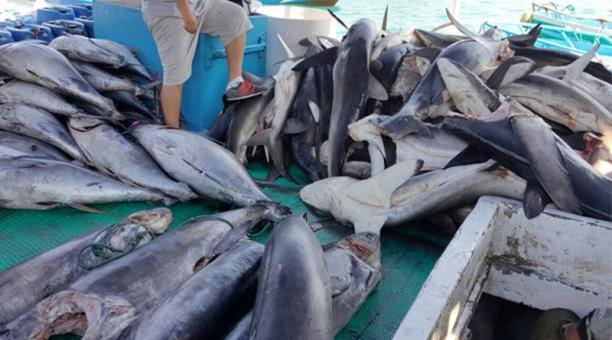This year will be no exception when it comes to the Chinese fishing fleet’s illegal, unreported, and unregulated (IUU) fishing practices in the territorial waters of Argentina, Chile, and Ecuador, the Argentine independent journalism site Urgente 24 said on January 3, 2022.
“It is estimated that 450 vessels will be in the Argentine sea for the season that begins [in January] and ends in April,” Urgente 24 reported. “In a short time, the number of vessels will likely reach 500. If one considers that each vessel could catch about 50 tons of squid per night, the economic damage is enormous,” the Argentine newspaper La Opinion Austral reported on January 14.
Foreign vessels illegally extract some 750,000 tons of fishery resources from Argentina’s exclusive economic zone (EEZ) each year, the nongovernmental organization (NGO) Argentine Society of Global Strategic Studies says on its website.

Depleting South America
The Chinese vessels spent the first half of 2021 in the Atlantic off the coast of Argentina, plundering squid stocks, illegally transferring fish between ships, and turning off transponders, the international investigative journalism organization InSight Crime said on December 23.
Meanwhile, the Chinese fishing fleet preys on the Argentine sea even during the closed season. “The Chinese fleet has been on the edge of the EEZ since late 2021, despite the Chinese government’s commitment to suspend squid fishing during the breeding and spawning season,” the Chilean newspaper Clarín reported.
Similarly, the fleet plundered important fishing areas bordering Chile and Ecuador in the Pacific. Its vessels have become expert at trawling just outside of the 200-nautical-mile EEZ zones of South American countries, catching fish by the millions, InSight Crime said.
Efforts to combat IUU fishing
Several Latin American countries are taking measures to protect marine wildlife from IUU fishing. In November 2021, Ecuador, Costa Rica, Colombia, and Panama signed an agreement to strengthen the Eastern Tropical Pacific Marine Corridor to protect their EEZs.
That same month, Argentina strengthened surveillance of the Chinese fleet, increasing satellite monitoring of suspicious vessels; patrolling the Strait of Magellan with Navy ships; deploying warships, patrol vessels, and aircraft; and increasing fines for IUU fishing, InSight Crime said.
In 2020, Ecuador, Chile, Colombia, and Peru issued a joint statement committing to confront IUU fishing to ensure the long-term subsistence of fishery resources, the Ecuadorian Ministry of Government said on Twitter.
Harmful subsidies
Most IUU fishing is carried out by China’s distant-water fishing fleet, the largest in the world, which the Beijing government subsidizes to the tune of billions of dollars annually, and which operates unrestricted in any region worldwide, the U.S.-based research and public policy NGO American Security Project (ASP) says on its website.
To deter these harmful fishing practices, the World Trade Organization (WTO), based in Geneva, Switzerland, is pushing negotiations to reach a multilateral agreement and set new rules for the global fishing industry, limiting government funding that contributes to the depletion of the planet’s fish stocks, Diálogo Chino, a London-based investigative journalism organization, reported.
“In 2022, the WTO will decide whether China can continue acting without any consequences,” Urgente 24 reported. Eliminating all harmful subsidies would help fish stocks recover; more exactly, it would mean a 12.5 percent increase in global fish biomass by 2050, Diálogo Chino said.









